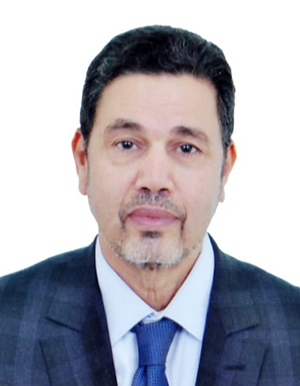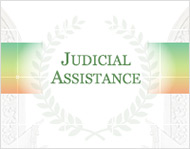The Application and Regulation of Digital Technology in the Judicial Field
The Application and Regulation of Digital Technology in the Judicial Field
M'Hammed Abdenabaoui, First President of the Court of Cassation, President Delegate of the Supreme Council of the Judicial Power of the Kingdom of Morocco
Mr. Zhou Qiang, President of the Supreme People's Court of China,
Mr. Yuan Jiajun, Secretary of the CPC Zhejiang Provincial Committee,
Presidents and judges of the High Courts and Tribunals,
Ladies and Gentlemen,
First of all, I would like to express my pleasure at participating in this high-level forum. And I would like to take this opportunity to extend my sincere gratitude to President Zhou Qiang for inviting me. I would like to reiterate to his Excellency the commitment of the Supreme Council of the Judicial Power of the Kingdom of Morocco to consolidate the ties of mutual assistance between the high courts of our two countries, which in addition to the Convention on Judicial Cooperation in Civil and Commercial Matters established on April 16, 1996, their two high courts are bound by the Memorandum of July 3, 2018, which provides especially for cooperation and exchange of good practice in the fields of digitalization of the courts and digital technology.
Ladies and Gentlemen.
Digital is now identified as the world's 4th industrial revolution. It offers major economic and social opportunities and brings great changes to the lives of citizens. This requires the adaptation of laws to the digital age, in order to reap the benefit from digitalization, and to limit the harm that can be caused by its abusive use.
The Kingdom of Morocco, - under the enlightened leadership of His Majesty King Mohammed VI, is fully aware that digital technology paves the way to develope the country's economic and social development, and improve the quality of the functioning of its administration, including the judicial administration which has been on the path of modernization for quite some time. Thus, a ministerial department for digital transformation has been set up. It is implementing a national transformation strategy with three main axes:
1.The introduction of digital administration.
2.The establishment of a digital ecosystem and incentives for innovation.
3.The social inclusion and human development.
The digitalization of the judicial system constitutes one of the pillars of the first axis concerning the digitalization of the administration. It aims at the establishment of the digital court, which will make it possible to carry out digital procedures such as the remote registration of complaints and legal actions, the request and obtainment of copies of judgments and certificates such as the criminal record or the trade registration; or the online payment of the judicial tax and fines and pecuniary sentences, as well as everything concerning the dematerialized processing of judicial files. Not forgetting the availability of online legislative texts and case law, on search engines appropriate to the needs of legal professionals such as magistrates and lawyers.
Moroccan courts, which have already benefited from some of the fruits of digitalization during the last two decades, are expecting an acceleration in the pace of digital transformation of the judicial system. This should allow justice professionals and litigants to benefit from other online services.
Finally, it should be noted that, in conjunction with the current efforts made by the Ministry of Justice in the technical field, the Moroccan authorities are working on a draft law on the digital transformation of judicial procedures, which should regulate remote trials, electronic notifications, and many other procedures.
This law will complement the legislative and normative texts already adopted on cybercrime, the protection of computer networks and systems, the protection of personal data, copyright and trademark ownership, and other aspects concerning online commerce and digitalization that affect the daily lives of citizens.
Last but not least, I would like to point out that in the absence of a specific law, Moroccan judges have used video-conference for remote trials for the benefit of detainees during the period of confinement implemented by the public authorities due to the covid pandemic; this technique was used with the consent of the accused in detention and his or her lawyer, which made it possible to try thousands of cases during a period in which the transfer of detainees to the courts constituted a real danger.
Ladies and Gentlemen,
Thank you very much and wish you a good continuation. To some a good day and to others a good night. It's 10 o'clock in the Morning in Rabat.
 |
| M’Hammed Abdenabaoui |
First President of the Court of Cassation
President Delegate of the Supreme Council of the Judicial Power The Kingdom of Morocco
EDUCATION
•Ph.D. in Law •Applied postgraduate studies degree in legal Sciences (DESA).
•Specialized Diploma in Administrative Justice (National Institute of Judicial; Studies (INEJ), Paris, France.
•Law Degree.
•Training on Refugee Law – Casablanca 2000. •Training on Commerce Jurisdiction’s -Rabat & Marrakech 1997.
POSITIONS HELD
•26 March 2021 to Present: First President of the Court of Cassation
•April 2017 – March 2021: King’s General Prosecutor at the Court of Cassation.
•March 2007 – April 2017: Director of Criminal Affairs and Pardons at the ministry of Justice.
•June 2005 – March 2007: Director of the Prisons and Rehabilitation Administration.
•January 2004 – June 2005: Advisor to the Minister of Justice.
•April 2000 – January 2004: Prosecutor at the Court of First Instance in Casablanca-Anfa.
•1997 – 2000: Head of Division at the Directorate of Criminal Affairs and Pardons at the Ministry of Justice.
•1984 – 1997: Prosecutor at the court of First Instance of Laayoune, Ben Slimane and Mohammedia. •1979 – 1984: Deputy Public Prosecutor at the courts of Tan Tan, Dakhla and Azilal.
PROFESSIONAL EXPERIENCE
•Member of the High Committee of the National Dialogue on the Reform of the Judicial System.
•Member of the Moroccan Delegation for Strategic Dialogue with the United States.
•Member of the Moroccan Delegation for the examination of the periodic report - UPR - of the Kingdom of Morocco before the National Council for Human Rights in Geneva in 2008 and 2012. •Member of the Advisory Unit in charge of the preparation of the draft of the Press Code - October 2012.
•Member of the Moroccan Delegation for the study of the Kingdom of Morocco’s Report before the Committee against Torture -2010.
•Former professor at the training Institute of the Judiciary.
•Participation as a trainer, in training courses for the prison Administration officials.
•Participation as a trainer and mentor, in training courses for juvenile affairs judges.
•Participation in training courses for judicial police officers.
•Member of the Moroccan Delegation to the Commission on Human Rights and the Human Rights Council (November 2004).
•Member of the Moroccan Delegation to the Working Group against forced Disappearances.
•Chair of the Moroccan group for the program of the modernization of prosecutors' offices" good governance program" and "United Nations development program".


